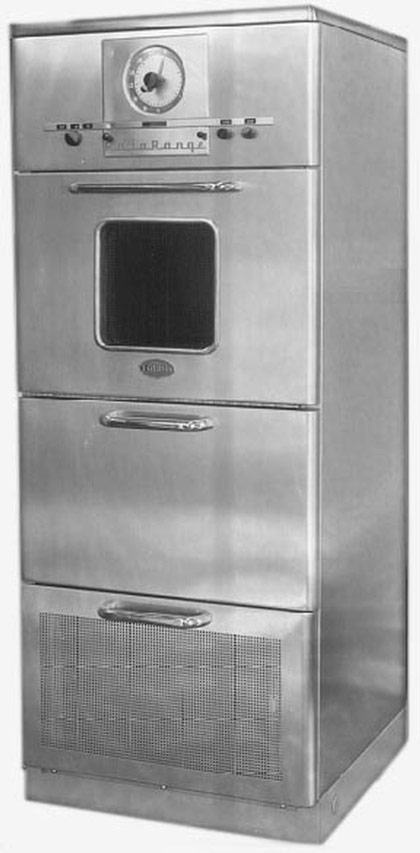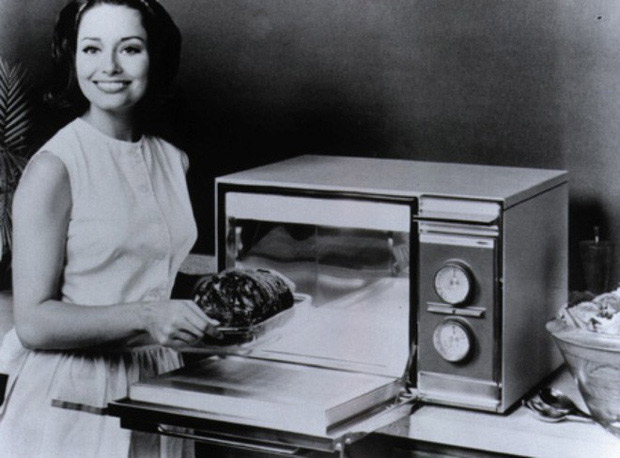7 random inventions but have an extremely important role in the history of human development
Sometimes due to improvisation or a small accident, people invented products that have played an important role in the history of human development. The following products are the most specific examples.
1. Microwave oven
In 1944, Percy Spencer - an engineer at Raytheon Corporation while testing a new vacuum tube in a radar project discovered that the chocolate bar he was putting in his pocket flowed faster than usual.

From there, he began other experiments by placing other objects such as eggs, corn kernels next to the tubes. Corn seeds are ripe and edible, eggs are ripe and exploding. Finally, Spencer concludes that these objects receive heat from microwave energy.

On October 8, 1945, Raytheon registered the copyright for the world's first microwave oven. In 1947, he started to create the first microwave oven, it weighs 340kg, 168cm high. Later, the microwave was improved and had a version for the first kitchen in 1965, priced at $ 500.
2. X-rays
In 1895, Wihelm Roentgen - a German physicist, experimented with a cathode ray tube. Even though the tube was covered, when the tube was turned on in the dark room, he could see the fluorescent screen nearby. The rays illuminated the curtain somehow.

Roentgen tried to use different objects to block these rays, but they were all ineffective. When he put his hand in front of the tube, he saw the bones of his palm show up on that curtain. Roentgen then used a photograph instead of a tube to capture the image, creating the world's first X-ray image.

The radiography technology was later used by medical institutions and research centers.
3. Vaseline


In 1859, Robert Chesebrough, a 22-year-old chemist, decided to investigate an oil well in Pennsylvania because he heard workers talking about a plastic compound getting into devices and causing them to fail. Workers even use this compound to soothe cuts on their skin. Chesebrough brought some to try.
After a series of experiments, the compound "petrolium jelly" now known as Vaseline, is often used Vaseline against dry lips, protecting small cuts on the skin .
4. Insulin

In 1889, two doctors at Strasbourg University, Oscar Minkowski and Josef von Mering removed the digestive-supporting pancreas from a healthy dog while learning about the agency. The next day, they noticed a large amount of flies around the dog's urine. The urine test result of the dog showed that the solution contained sugar. This shows that, after being removed from the pancreas, the dog became obese.
After a series of studies from 1920 to 1922, researchers at the University of Toronto isolated the secretion from the pancreas and named it insulin. The research team has been awarded the Nobel Prize.
5. Teflon


In 1938, Plunkett, an employee of the Jackson laboratory at Dupont, was testing a new refrigerant. He used a compound called tetrafluoroethylene gas (TFE) and stored it in a small cylinder. When he opened the cylinder, he suddenly discovered that the gas had disappeared and appeared a strange white powder.
After a few tests, Plunkett discovered that this substance has a low friction surface, is resistant to heat, is resistant to corrosive acids. An ideal substance for kitchen appliances.
Non-stick pans are one of the most outstanding applications of teflon. Therefore, non-stick pans are also known as teflon pans.
6. Super durable adhesive
Harry Coover Jr. a researcher at Kodak Laboratories stumbled upon cyanoacrylates while trying to develop guns for plastics during World War II. Because this compound is too sticky, can stick anything completely together, so it was ignored by Coover.

A few years later (1951), Coover engaged in cyanoacrylatey research to develop an anti-heat layer for the cockpit. A colleague of Coover, named Fred Joyner, while trying to measure the refractive index of cyanoacrylatey, accidentally dropped this compound between the two lenses and could not separate it anymore.

This accident helped Coover realize the potential of cyanoacrylatey, then it was developed and marketed as Super Glue.
8. Car safety windshield
In 1903, a French scientist Edouard Benedictus dropped a glass jar containing a solution of cellulose nitrate, a form of liquid plastic, off the shelf. Immediately, the jar fell to the floor and cracked. The solution evaporated, but what surprised Benedictus was that the glass jar did not shatter but retain its shape.
Benedictus said it was the liquid plastic that clicked on the edge of the glass jar and helped it retain its shape after being dropped. Benedictus then began to experiment with the solution to produce the first safety glass plates. Later, safety goggles were heavily used in windshields, eye tracking goggles and more.

- Did you know: What was made of auto glass that did not break in an accident?
- 28 great inventions need to be replicated everywhere